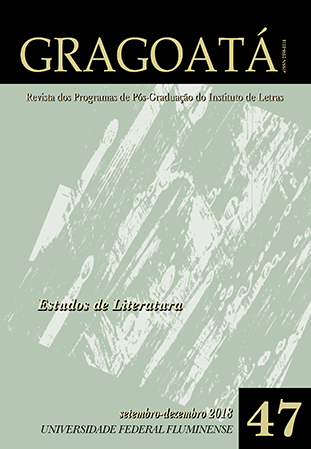A ciência monstruosa em 'Frankenstein': aspectos do pós-humano
DOI:
https://doi.org/10.22409/gragoata.v23i47.33606Palavras-chave:
Frankenstein, ciência, pós-humano.Resumo
Este trabalho tem por objetivo investigar de que maneira as descobertas e o pensamento científico do final do século XVIII e início do século XIX (período conhecido como Segunda Revolução Científica) influenciaram a escrita do romance Frankenstein (1818), de Mary Shelley, assim como analisar como essa obra apresenta aspectos que contribuem para o estudo do pós-humano. Frankenstein foi escrito em meio a um contexto de profundas revoluções no pensamento filosófico-científico que informaram diversos elementos presentes no romance: as teorias sociais de William Godwin e Mary Wollstonecraft, as hipóteses sobre o princípio da vida de Erasmus Darwin, os experimentos com eletricidade de Luigi Galvani, entre outros. Por outro lado, em uma perspectiva contemporânea, Frankenstein é uma obra que inaugura vários aspectos que viriam a ser lidos pelo prisma do pós-humano. Ao descrever as possíveis (e terríveis) consequências da junção da esfera do humano com as do animal e do tecnológico, o romance problematiza a posição privilegiada do homem na natureza. Considerando as características físicas e biológicas do monstro, o desejo de Frankenstein em ultrapassar os limites da natureza, e a complexa relação de ambos os personagens no que se refere ao binômio desejo/liberdade, o romance pode ser lido como um dos grandes representantes do conceito de pós-humanidade na literatura.
---
Downloads
Downloads
Publicado
Edição
Seção
Licença
AUTORIZAÇÃO
Autores que publicam em Gragoatá concordam com os seguintes termos:
Os autores mantêm os direitos e cedem à revista o direito à primeira publicação, simultaneamente submetido a uma licença Creative Commons Atribuição 4.0 Internacional (CC BY 4.0), que permite o compartilhamento por terceiros com a devida menção ao autor e à primeira publicação pela Gragoatá.
Os autores podem entrar em acordos contratuais adicionais e separados para a distribuição não exclusiva da versão publicada da obra (por exemplo, postá-la em um repositório institucional ou publicá-la em um livro), com o reconhecimento de sua publicação inicial na Gragoatá.
A Gragoatá utiliza uma Licença Creative Commons - Atribuição CC BY 4.0 Internacional.











